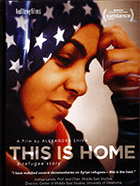
This Is Home: A Refugee Story 2018
Distributed by Bullfrog Films, PO Box 149, Oley, PA 19547; 800-543-FROG (3764)
Produced by Alexandra Shiva
Directed by Alexandra Shiva
DVD, color, 91 min.
High School - General Adult
Immigration
Date Entered: 01/02/2019
Reviewed by Jeffrey Pearson, University of Michigan Ann ArborAlexandra Shiva’s documentary opens with horrific scenes of the utter ruin of street after street due to bombing in Homs, Syria. That alone says volumes about why so many Syrians have left their country to seek asylum elsewhere. But the strength of This Is Home: A Refugee Story is the intimate time we spend with 3 Syrian families seeking new lives in Baltimore, Maryland. With no voice over or overt interviews, the camera simply follows them from the moment they arrive in a Baltimore resettlement center run by International Rescue Committee, to the end of the 8 months of assistance they receive to achieve self-sufficiency. The IRC provide interpreters, home and job placement, and help with starting to learn English and the ways of American culture.
What is mundane for us is monumental for them; how to shop, dress for work, greet Americans and shake hands. As we witness their struggle to learn, adapt and assimilate we can’t help but wonder how we would do in their place, in a new country with a new language. We appreciate them as people who only want safety and opportunities for their children. We see the hope and frustration on their faces. We see them as individuals and families with the same concerns and needs as us. Perhaps the most riveting moment in the film is the answer given by the refugee Khaldoun when asked if he misses Syria. Fleeing Homs after being tortured, now in Baltimore with his wife and 4 children, the simple litany of his loss is heartbreaking. House, neighbors, family, his childhood memories, the water, food, the soil, the support and love of his community, all gone. He agonizes that he tried, but could not stay. “Do you miss Syria,” he says, is to ask, “Do you miss your mother?” “Where’s my mother?” he pleads, “Where’s my country?”
The film takes a dark turn with the announcement of President Trump’s travel ban, raising doubt as to their welcome in this country, and adding fear about the prospects of relatives still in Syria who they hoped would follow them to the U.S. Nevertheless, the film traces an arc to the positive as the children find success and friends in school and the parents find steady and rewarding work. One of the mothers, Madiha, makes a friend who suggests that she cook a Syrian dinner at her church as a first step to perhaps starting a catering service. Madiha and her friend shop for food, Madiha cooks for 150, and we witness the church community open their hearts to the Syrians and their culture as they enjoy the meal. The gathering is a beautiful demonstration of the American ideal of desiring, welcoming, and accepting those from other countries who seek better lives, and who contribute to ours.